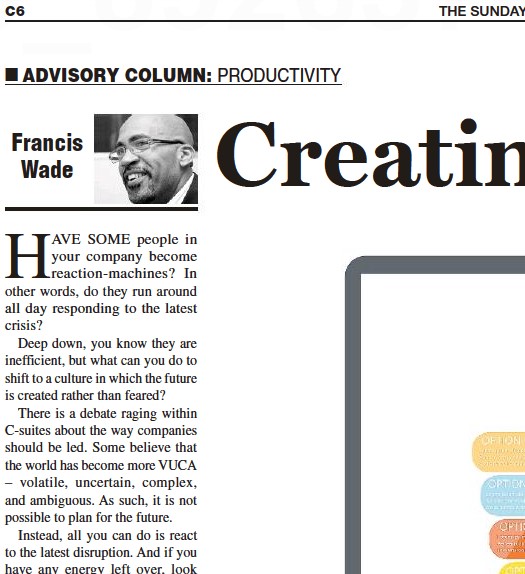Have some people in your company become reaction-machines? In other words, do they run around all day responding to the latest crisis? Deep down, you know they are inefficient, but what can you do to shift to a culture in which the future is created rather than feared?
There is a debate raging within C-suites about the way companies should be led. Some believe that the world has become more VUCA (volatile, uncertain, complex and ambiguous.) As such, it’s not possible to plan for the future.
Instead, all you can do is react to the latest disruption. And if you have any energy left over, look ahead…but only for no more than five years. COVID has made this opinion popular.
But I think it’s an excuse.
The opposing point of view is that individuals and companies need a vision of the future.
If you believe in the latter, and prefer to create the future, here are ways to persuade others who feel the activity is a waste of time.
1) You can’t stop creating the future
Fact: in any company, the leadership team is always shaping the future. It may be disjointed, muddled, and hidden from view, but there is a destination being realised with every decision. This can’t be helped.
The only question is, is it being done well or badly?
In essence, a future being realised badly is one that lacks definition, so no-one can put words to it. In fact, two managers might say opposite things when asked. “Survival” may be the only commitment they have in common.
So it’s a free-for-all, with some people playing football while the rest are playing cricket.
As such, there’s a lot of drama, with balls flying everywhere. At the end of the day, when everyone is exhausted, the action stops. Some balls will be near the boundary, others lie in the back of nets, but no-one can tell the score.
Consequently, when good employees sense that the vision is poorly defined, they leave.
2) Things will always change
Another excuse given to avoid planning for the future is that conditions alter too often. Why create another disappointment? Instead, desist from planning because it would only add to a string of prior letdowns.
I think our experience in Jamaica with Vision 2030 is instructive: a country which is “the place of choice to live, work, raise families and do business.” Even though governments have changed, and mishaps have occurred, it remains a single point of focus for our citizens.
Even though we have much to accomplish with limited time left, the reality is that it is still our shared goal…whatever comes to pass.
This puts things in perspective, and allows us to lift ourselves from the most recent shooting, drought or political conflict. As a leader, you can also give your workers a sense of purpose.
They need not surrender to the latest drama unfolding in their email inbox.
3) You don’t know how
But perhaps the most salient reason companies get stuck in the short-term is that long-term planning is too hard. It takes too long.
Furthermore, they see the end-product as overly detailed and rigid.
In my firm, we recently began a study of 50 past long-term strategic planning retreats. Based on two decades of experience, I am able to declare that the old point of view is outdated. Fortunately, both short and long-term strategies may be completed together in a few days.
This means that with the right skills, there should be no obstacles.
But don’t take my word for it. Chances are, you belong to an organisation which does not have a 15 to 30-year strategic plan. It could be your place of work, church you attend, or even an alumni group.
Make this practical – gather people together in a meeting to create a big vision, and a multi-year strategy to underpin it. As you engage in the process, follow the steps outlined in my Gleaner columns from February 5, 2023, and November 3, 2019 as guides.
Remember that the point is to inspire your team with the possibility of a breakthrough result.
This exercise will take you one step closer and help reverse the myth that life today is more uncertain than ever. It’s not true. In fact, the end of World War II was more hectic, but it led to the creation of a number of long-term institutions such as the United Nations and World Bank.
Our challenges in 2023 pale in comparison. Take practical steps to give your organisations an inspiring future today. Don’t hold back because you are scared or misinformed.
Francis Wade is the author of Perfect Time-Based Productivity, a keynote speaker and a management consultant. To search his prior columns on productivity, strategy, engagement and business processes, send email to columns@fwconsulting.com.

